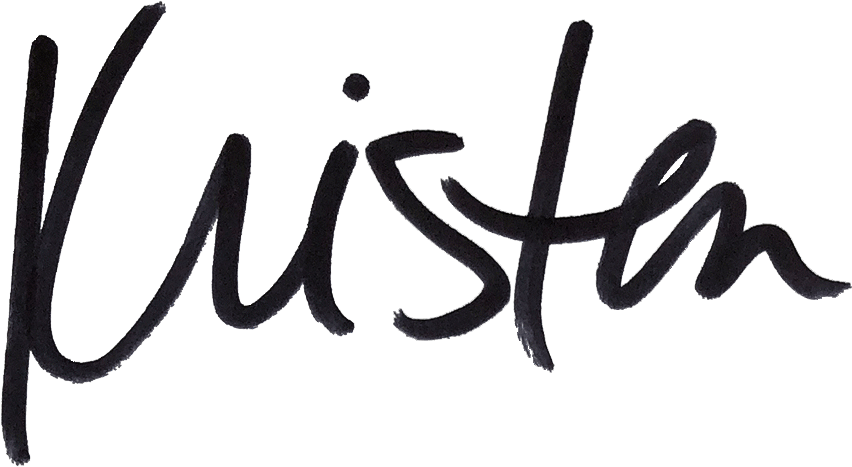Recently, I had a new dominatrixing client referred to me by one of my most trusted peeps, and yet I was really hesitant to get on our first call together. Online, this woman appeared to be chic and elegant, styled and fancy. (All things I am not, as evidenced by everything I’ve ever created ever.)
When we got on the phone, this delightful creature told funny stories and made me laugh and told me all about her struggles with finding clients. That’s when it clicked: you’re not the person you appear to be online!
You’re MORE than that. Yes, you like pretty and girly stuff, but you’re also prone to making “That’s what she said” jokes. You enjoy a styled shoot just like the next person, but you’re also the one encouraging the bride to shoot hoops at her wedding.
My fantastic client was leaving out the “and” because being girly and wonderfully weird is way more vulnerable than defaulting to girly. Adoring details and making memories with clients is not as clear cut a line as simply beautifully arranging wedding bits and bobs to show off on Instagram.
She was dimming down her weird and was about 14.2 miles down the yellow brick Kinfolk road, posting perfect image after perfect image and giving her true peeps no chance of seeing her weird.
This, then, is a guide for bringing your weird to light without freaking out, going too far, or pushing all your peeps away in a flurry of strangeness.
First, assess your weird.
If the person I would meet in person, just the two of us at 7pm on a Tuesday isn’t exactly the same as the person you are online, you’ve got room to add your weird into the mix.
Weird means quirky, unique, interesting, and YOU.
Weird does NOT mean unprofessional.
Let’s divorce the two things, shall we?
Let’s separate your quirks from your professionalism: ability to treat people kindly, to respond to communications in a timely fashion, to ship products, to deliver services, and to do what you say you’re going to do across the board.
My inability to wear socks until it is absolutely necessary at some frigid point in October in no way impacts my ability to be on time for our scheduled coaching calls.
My love of Harry Potter doesn’t prevent me from being fully present and capable of supporting my clients when they need me most.
My love of the word “Fuckbuckets” doesn’t keep me from delivering sound, cash-making, heart-centered business advice for my peeps. If anything, it frees them up to be themselves. My last few dominatrixing clients have doubled their businesses when they stopped trying to fit in and let their weird bits hang out.
Also: ‘weird’ is another word for ‘vulnerable.’
It’s not easy to show people your quirks. Your brain’s job is to convince you that everyone wants to see only your pretty, pretty perfect life. What if people judge your house, your hair, your pets, your kids, your business, your life? What if they think your ninja moves are strange, or your book collection is stupid, or your devotion to black coffee is pretentious?
Brain wants you to play it safe and hedge your bets by showing people varying degrees of perfection porn. Your meticulously organized closets, your freshly arranged flowers, and your darling workspace are much easier to show off than your windblown hair, your chipped old mug, and your 6-day old bouquet that is starting to smell funny but that you still love because your kids picked those flowers for you.
Only.
Your peeps — the ones who will adore you and keep you in business for years to come — can’t love you if you don’t show them who you are. They can only love what they’re shown.
If what you’re showing people isn’t all the way deep-down true, you’ll end up resenting your clients, hating your business, and resenting the shit out of everyone who lines up to give you money.
Fun, eh?
You don’t show people the real you, then they like the not-real you, then you assume that no one could possibly like the real you because no one currently does…because you’re not showing it to them. DO YOU SEE THE MADNESS OF THIS CYCLE.
Further. Weirdness and vulnerability are what we want from everyone else, but we’re the least willing to give to others first. It’s like a new couple in love having a hanging-up-the-phone fight:
You be vulnerable first!
No, you!
No, YOU!
Only no one goes first, and then we default to pretending we’re fine and exchanging social pleasantries.
::bashes head on desk::
::inserts Starbucks IV drip to counteract the boredom::
“Vulnerability is our most accurate measurement of courage.” — Brene Brown
Be courageous in small doses. You don’t have to go from referring yourself exclusively in the third person and keeping all your clients at arm’s length to suddenly telling us about every sexual encounter you’ve ever had, or every dream you nourish in secret, or cataloging your grossest habits and calling out each one, body part by body part.
Vulnerability is a practice. You can open a little every day.
No need to treat it as an all-or-nothing deal. You can start with a list of quirky yet harmless facts.
Here, I’ll go first:
+ I can’t wear high heels unless I’m the Maid of Honor in your wedding. Even then, I’ll have had my dress tailored to go barefoot at the reception.
+ My aspirational self is Martha-motherfucking-perfection-Stewart and my actual self uses Mod Podge and glitter for every craft project I undertake. Everything else is too complicated.
+ I can’t even look in the general direction of Kinfolk magazine. I want to walk into every scene and yell, “Bored!” before throwing glitter everywhere and ruffling up all the perfect scenes. (I’m really bad at perfection porn of all kinds, I’ve learned.)
+ My belly doesn’t like dairy, but ice cream is still my favorite favorite food. I understand that this is stupid AND YET chocolate marshmallow.
+ I invited everyone in the Fuck Yah Club to go watch Quidditch with me on Saturday. Because why not?
When you’re willing to show people the real you, they can actually fucking love the real you, and then you can make some friends that you actually adore who happen to sometimes give you money. (Some people call them ‘clients.’)
This is, I assure you, a far better fate than trying to remain “professional” while resenting the shit out of your clients, eroding your love of your work, and pretending to be someone else for the rest of your days.
Let your weird out.
Regale us with your strange habits.
Refuse to hide behind small moments of perfection.
We can’t wait to love you, just as you are. (Now, who wants to glitter craft with me!?)
***********Oh, and! This is important. You can take on weird at your own pace. You don’t have to show us your deepest wounds or unhealed bits. You don’t have to talk about anything you’re going through until you’re past the gaping wound phase.
In other words: please don’t try teaching us lessons about grief three days after your fiancee dies. Don’t teach us about anxiety when you’re experiencing a string of unexplained attacks that you and your doctor haven’t quite figured out. Don’t teach us about bankruptcy while you’re still crying on the floor every night and you’re $94,247.56 in the hole.
Give yourself a little room to heal, okay?
The point of letting your weird out is to be a touch more revealing than you find strictly comfortable without triggering all of your peeps’ collective ‘OH GOD I MUST HELP HER SOMEHOW’ feels. Triggering our motherly instincts helps no one and will only do damage to everyone involved.
Permission to take your time, granted.
Permission to show us your weird: given.
Permission to be exactly who you are, swears and ninja kicks and all: you got it.
::mwah::
K
P.S. Here are my top 8 bookstores on Earth. Because I know you know about bookstore weird.










